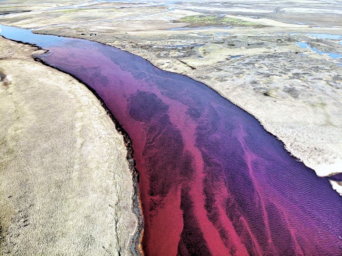- About
- Topics
- Picks
- Audio
- Story
- In-Depth
- Opinion
- News
- Donate
- Signup for our newsletterOur Editors' Best Picks.Send
Read, Debate: Engage.
| topic: | Pollution |
|---|---|
| located: | Russia |
| editor: | Igor Serebryany |
Russian environmental protection and consumer wellbeing watchdog Rospotrebnadzor (RPN) withdrew around 30 million people from the territories considered polluted and unsafe for living.
The operation conducted overnight has nothing to do with a rescue evacuation or massive landscape cleaning. The "cleaning" has been made by the RPN head office with a stroke of a pen: The agency issued new environmental standards which increased the maximum concentration limits of hazardous substances in air and water by sixty times compared to the previous levels set up in 2009.
The RPN stroke out from the list several substances previously labelled as hazardous – such as formaldehyde, methanol, methyl mercaptan, nitrogen dioxide (CO2). The choice of the "pardoned" chemicals is not random: those substances infiltrate underground waters and enter into the air at the waste dumps.
Yet in 2019, president Vladimir Putin issued a decree envisaging to solve the waste dumps problems in the country where rubbish has not been recycled but dumped overland. Some waste sites in Moscow region have now been the largest in Europe, creating artificial mountain landscape here and there (some of those handmade hills, where unfenced, have even been used as ski trails in winter).
According to the Greenpeace Russia estimations, about 50 million of the country's population lives in the environmentally unfriendly conditions due to industrial pollution and uncontrolled garbage dumping.
In the recent years, residents in the Moscow region rallied by the thousands, demanding to close the landfills. The protests were put down by riot police but the authorities have learned a lesson. In 2019, they promised to start dumping garbage produced in Moscow not in the surrounding forests but in a remote subpolar Archangelsk region.
The tactic didn't work: anti-pollution rallies immediately sparked in the Archangelsk region, with hundreds of environmentalists from Moscow joining them. When authorities found out that they failed to "solve" the problem just moving it far away from the politically active capital, they found a new "key" to execute Putin's order.
By easing the maximum concentration limits of the harmful substances, the RPN made living conditions "adoptable" for 30 out of 50 million Russians currently living in the polluted zones.
The RPN's decision is a blatant act of state hooliganism, director of the All-Russia Nature Institute Andrei Peshkov says. "To give it straight from the shoulder, this is a crime. I don't use that exact word only because there's no federal law that entails the rules of softening the environmental requirements," he says.
Peshkov notes that the Russian authorities have been moving in the direction opposite to the global environmental trends. In Russia, the maximum concentration limits of pollutants have been relaxed gradually and, by this year, increased 660 times compared to 1999.
"It would be right if that tactic is investigated by the prosecutors or, at least, the Health Ministry. I swear no research that approves such a massive easing of environmental protection standards has been conducted. It is scientifically impossible to give reasons for easing the standards at such a huge scale unless they are paid", the scientist says.
Peshkov notes that the RPN's decision to relax environmental standards would leave 30 million people in distress for life.
